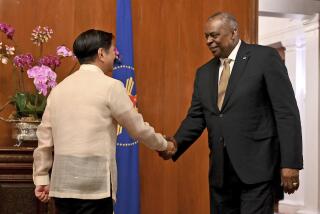Aquino Would Allow U.S. to Use Bases at Least to 1991
- Share via
OLONGAPO, Philippines — Presidential candidate Corazon Aquino on Thursday told thousands of cheering people who live near Subic Bay Naval Base that she would allow the United States to use Philippine military bases at least until 1991.
It was her most pro-American statement yet in the campaign for the Feb. 7 election, which President Ferdinand E. Marcos called more than a year ahead of schedule to prove he has public support.
Marcos has accused his opponents of having Communist sympathies and of receiving funding from U.S. sources. Both contentions have been denied by Aquino, wife of assassinated opposition leader Benigno S. Aquino Jr., and Salvador Laurel, her vice presidential running mate.
A group founded in 1983, called the Ninoy Aquino Movement, announced Thursday in Andover, Mass., that it has launched a drive to raise $4.5 million for Aquino’s campaign through contributions from Americans and Filipinos who live in the United States.
An Experienced Pilot
Earlier Thursday in Manila, Marcos described himself as an experienced pilot flying through a storm and compared Corazon Aquino to an untested flyer who tries to take over an airplane. He also charged that the Communists would try to share power in a coalition government if the opposition won.
Olongapo, at the gate of the sprawling Navy base, depends upon the large U.S. presence for its livelihood.
“If she’s against the bases, I’m against her,” said a 42-year-old woman of Aquino’s candidacy. “We’re getting our bread and butter from the United States,” said the woman, who would not give her name.
Laurel denied what he said were false fears spread by Olongapo Mayor Richard Gordon and Marcos that an opposition victory would mean an end to U.S. use of Subic Bay and the nearby Clark Air Base.
He said the Americans would have to deal with Aquino if they wanted to continue using the bases after 1991.
Keeping ‘Options Open’
Aquino, who spoke after Laurel, said, “I will respect the bases up until 1991 and keep all of our options open.”
Thousands of people packed into an outdoor basketball court cheered the opposition candidates during their stop here on a daylong swing through two provinces north of Manila.
Under the treaty allowing the United States to use the bases, either side may end the agreement after 1991 upon giving a year’s notice. Subic and Clark technically are Philippine bases, although the American presence overwhelms the tiny Filipino military contingents at each facility.
The bases, considered by U.S. officials to be vital for Asian and U.S. security interests, employ about 40,000 Filipino civilians.
Some officials of Marcos’ government have proposed ending the treaties if the U.S. Congress does not restore its recent cuts in military aid to the Philippines.
Lawyers File Appeal
Meanwhile, lawyers for Aquino appealed to the Supreme Court to defer a voter registration law they said might prevent more than 1 million people from casting ballots in February’s election.
The appeal came less than 24 hours before special military police mobile forces were to go on standby alert to guard against violence and fraud during nationwide voter registration Saturday and Sunday.
An estimated 2.5 million to 3 million Filipinos ages 18 and older who did not vote in the May, 1984, parliamentary elections are believed qualified to register to cast ballots in the Feb. 7 election.
But lawyers for the United Nationalist Democratic Organization said that more than 50% of the new registrants may be unable to comply with a rule that each provide four photographs for identification.
Although lawyers suggested that the provision would be a useful safeguard against voter fraud, they argued that the short period within which potential voters have to comply, the cost and the lack of photographers in rural areas could limit those who qualify.
More to Read
Sign up for Essential California
The most important California stories and recommendations in your inbox every morning.
You may occasionally receive promotional content from the Los Angeles Times.










